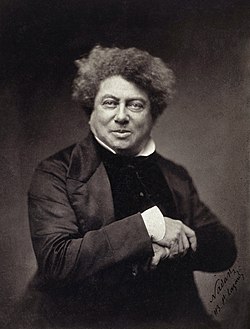Alexandre Dumas Quote
Come here, Grimaud, said Athos. To punish you for having spoken without leave my friend, you must eat this piece of paper: then, to reward you for the service which you will have rendered us, you shall afterwards drink this glass of wine. Here is the letter first: chew it hard. Grimaud smiled, and with his eyes fixed on the glass which Athos filled to the very brim, chewed away at the paper, and finally swallowed it. Bravo, Master Grimaud! said Athos. and now take this. Good! I will dispense with your saying thank you. Grimaud silently swallowed the glass of Bordeaux; but during the whole time that this pleasant operation lasted, his eyes, which were fixed upon the heavens, spoke a language which, though mute, was not therefore the least expressive.
Come here, Grimaud, said Athos. To punish you for having spoken without leave my friend, you must eat this piece of paper: then, to reward you for the service which you will have rendered us, you shall afterwards drink this glass of wine. Here is the letter first: chew it hard. Grimaud smiled, and with his eyes fixed on the glass which Athos filled to the very brim, chewed away at the paper, and finally swallowed it. Bravo, Master Grimaud! said Athos. and now take this. Good! I will dispense with your saying thank you. Grimaud silently swallowed the glass of Bordeaux; but during the whole time that this pleasant operation lasted, his eyes, which were fixed upon the heavens, spoke a language which, though mute, was not therefore the least expressive.
Related Quotes
She was a gypsy, as soon as you unravelled the many layers to her wild spirit she was on her next quest to discover her magic. She was relentless like that, the woman didn't need no body but an open r...
About Alexandre Dumas
His works have been translated into many languages and he is one of the most widely read French authors. Many of his historical novels of adventure were originally published as serials, including The Count of Monte Cristo, The Three Musketeers, Twenty Years After and The Vicomte of Bragelonne: Ten Years Later. Since the early 20th century, his novels have been adapted into nearly 200 films. Prolific in several genres, Dumas began his career by writing plays, which were successfully produced from the first. He wrote numerous magazine articles and travel books; his published works totalled 100,000 pages. In the 1840s, Dumas founded the Théâtre Historique in Paris.
His father, General Thomas-Alexandre Dumas Davy de la Pailleterie, was born in the French colony of Saint-Domingue (present-day Haiti) to Alexandre Antoine Davy de la Pailleterie, a French nobleman, and Marie-Cessette Dumas, an African slave. At age 14, Thomas-Alexandre was taken by his father to France, where he was educated in a military academy and entered the military for what became an illustrious career.
Alexandre acquired work with Louis-Philippe, Duke of Orléans, then as a writer, a career that led to his early success. Decades later, after the election of Louis-Napoléon Bonaparte in 1851, Dumas fell from favour and left France for Belgium, where he stayed for several years. He moved to Russia for a few years and then to Italy. In 1861, he founded and published the newspaper L'Indépendent, which supported Italian unification. He returned to Paris in 1864.
English playwright Watts Phillips, who knew Dumas in his later life, described him as "the most generous, large-hearted being in the world. He also was the most delightfully amusing and egotistical creature on the face of the earth. His tongue was like a windmill – once set in motion, you would never know when he would stop, especially if the theme was himself."
